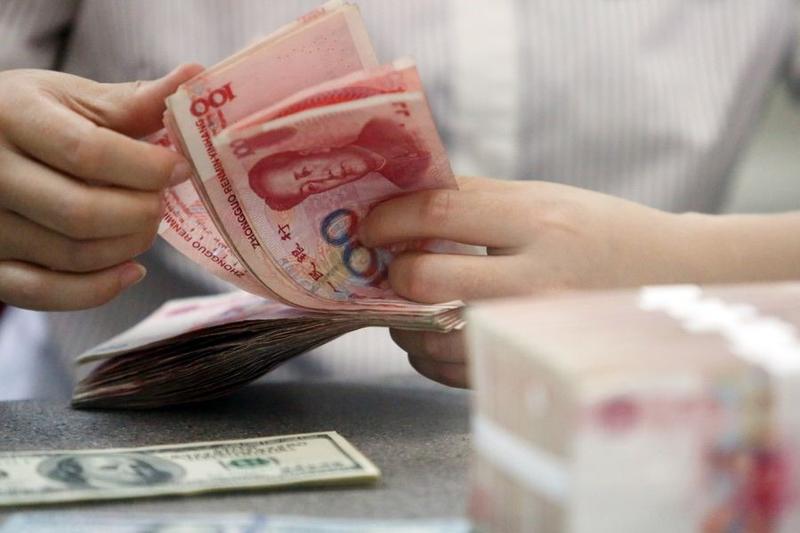 A worker counts Chinese currency renminbi at a bank in Linyi, East China's Shandong province. (PHOTO / XINHUA)
A worker counts Chinese currency renminbi at a bank in Linyi, East China's Shandong province. (PHOTO / XINHUA)
The rising global use of the Chinese renminbi will accelerate the world's shift toward a multipolar international currency system, a process critical for global financial stability as the drawbacks of the dollar-centred system can no longer be ignored, experts said.
The prospects for renminbi internationalization are growing partly due to China's increasing local currency settlements in bilateral trade, especially with countries exporting commodities and resources, they said.
The progress of renminbi internationalization has been in the spotlight as a rising number of major emerging economies expanded the renminbi's use in trade, financing and reserve management.
After China and Brazil reportedly reached a deal to trade in their own currencies, the Brazilian central bank said on Friday that the renminbi had surpassed the euro to account for the second-biggest share of Brazil's international exchange reserves.
The use of the renminbi is also growing among oil exporters. Data compiled by Bloomberg showed that the renminbi has replaced the US dollar as the most traded currency in Russia, while the Export-Import Bank of China achieved the first renminbi loan cooperation with the Saudi National Bank, the largest bank in Saudi Arabia, in March.
Shao Yu, chief economist at Orient Securities, said the renminbi has gained more international use as many economies are looking for alternatives to the dollar-centred monetary system, following the weaponization of the dollar in sanctions and years of quantitative easing that could erode the greenback's purchasing power.
"The trend is set to continue," said Shao, who is also an expert member of the monetary policy committee of the People's Bank of China, the nation's central bank. "Resource exporting countries seem to be willing to use local currencies when trading with China."
The rising use of the renminbi will contribute to global financial stability as a more diversified international monetary system helps dilute the risks brought by fluctuations in the dollar's value, the ongoing US financial turmoil and mounting US government debt, Shao said.
Calvin Fu, chairman of the China Innovation Finance Institute, said he expects the renminbi's use to expand particularly in countries that have close trade partnerships with China, such as oil producers in the Middle East and Central Asia, mineral and agricultural exporters in South America and Southeast Asian countries that are active in trade.
The use of the renminbi creates a win-win situation for China and its trade and investment partners by reducing the losses caused by exchange rate fluctuations, said Fu, who formerly worked as a financial regulatory official in the Middle East.
Factors supporting the growing role of the renminbi as an alternative to the dollar are China's role as a manufacturing powerhouse and the stability of the renminbi's value, experts said.
The PBOC regards maintaining currency value and financial stability as the most important policy task, Yi Gang, governor of the central bank, said on Tuesday at the 2023 Annual Conference of China Society for Finance and Banking/China Monetary and Financial Forum.
The central bank's balance sheet expanded by about 3 percent annually in the past five years, which is relatively modest and supportive of price stability, Yi said.
Nevertheless, experts noted that there remains a big gap between the renminbi's global profile and developed economies' currencies. The renminbi's share of global foreign exchange reserves stood at 2.69 percent in the fourth quarter of last year, ranking fifth among all currencies yet much less than the dollar's 58.36 percent, data from the International Monetary Fund showed on Friday.
Zhong Zhengsheng, chief economist at Ping An Securities, said recent developments show that the renminbi has seen expanded use in some regions, but this does not make it a real major international currency, which requires a wide use of the renminbi globally.
Boosting the global role of the renminbi requires more efforts to strengthen domestic economic fundamentals and deepen financial market reform and opening-up, which would boost the attractiveness of renminbi-denominated assets, Zhong said.
Related efforts are in full swing. For example, efforts will be made to expand the Bond Connect program to facilitate overseas investors' access to bonds traded in the mainland's exchange market, Eddie Yue, chief executive of the Hong Kong Monetary Authority, said at the same event as the PBOC governor on Tuesday.
"Patience is needed in the course of renminbi internationalization," said Shao from Orient Securities. "When China's huge financial market — with onshore and offshore sections integrated — generates abundant demand for financing and investment using the renminbi, it would be natural for the renminbi to become a key international currency."


